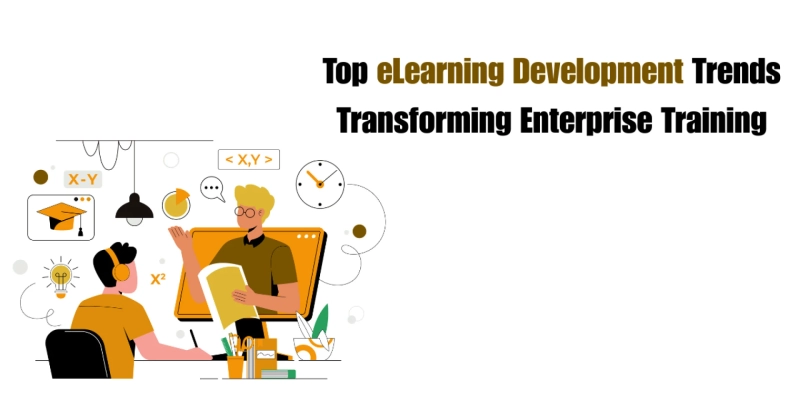Introduction
In today’s fast-paced business environment, enterprise organizations face mounting pressure to reskill and upskill their workforces rapidly and at scale. Traditional, instructor-led training methods no longer meet the demands of geographically dispersed teams, evolving technologies, and diverse learner needs.
This shift has accelerated the adoption of eLearning solutions, but not just any solution. Forward-thinking enterprises are now turning to the latest eLearning trends that emphasize flexibility, personalization, and measurable outcomes. From AI-driven learning paths to custom content tailored to business goals, these innovations are redefining how large organizations approach training.
In this blog, we’ll explore the most impactful eLearning development trends shaping enterprise training in 2025—and how your organization can stay ahead of the curve.
Trend 1 – Strategic Custom eLearning Development
Off-the-shelf training content rarely delivers the depth or relevance enterprises need. As workforce challenges grow more complex, custom eLearning development is becoming a strategic priority.
Custom solutions allow organizations to align training programs directly with internal goals, processes, compliance requirements, and job roles. Whether it's onboarding, sales enablement, or leadership training, tailored content ensures that every module resonates with your audience and reflects your brand.
Moreover, custom eLearning is built to scale—making it ideal for large, diverse teams. It offers greater control over updates, localization, and integration with enterprise systems like LMS, LXP, and HR platforms.
For enterprises focused on performance, engagement, and long-term ROI, custom development is no longer optional—it’s essential.
Trend 2 – The Rise of Full-Stack eLearning Developers
As enterprise training programs become more complex and technology-driven, the role of the eLearning developer has evolved significantly. Today’s developers are no longer just content creators—they’re full-stack professionals who blend instructional design, user experience, and technical integration.
Modern eLearning developers must be proficient in tools like Articulate Storyline, Adobe Captivate, HTML5, and SCORM/xAPI standards. But technical skill alone isn’t enough. They also need to ensure content is responsive, accessible (WCAG-compliant), and compatible with multiple devices and LMS platforms.
In enterprise environments, developers often collaborate with instructional designers, SMEs, and IT teams to build scalable, modular content that supports business continuity across departments and regions.
The demand for agile, multi-skilled eLearning developers is rising fast, and they’re key to executing custom, data-driven training strategies that deliver real impact.
Trend 3 – AI-Driven Personalization in Enterprise Training
Enterprises are shifting away from one-size-fits-all learning experiences in favor of intelligent, personalized training paths, and AI is at the center of this transformation.
Modern eLearning development increasingly leverages artificial intelligence to deliver adaptive learning experiences. AI analyzes user behavior, performance data, and engagement patterns to tailor content in real time. This results in more efficient learning journeys, higher knowledge retention, and improved employee satisfaction.
For example, an AI-powered system can recommend specific modules based on a learner’s role, past performance, or even their preferred learning format (video, interactive, text-based). It can also automate assessments, provide instant feedback, and flag skills gaps—freeing up L&D teams to focus on strategy rather than administration.
By embedding personalization at scale, AI is helping enterprises make training more relevant, impactful, and results-driven.
Trend 4 – Microlearning for Operational Agility
Enterprise employees are busier than ever—and long, traditional training modules no longer fit their schedules. That’s why microlearning has become a go-to eLearning trend for organizations aiming to increase training efficiency without compromising depth.
Microlearning delivers bite-sized content focused on a single objective or task. Whether it’s a 3-minute video, a quick scenario-based quiz, or a step-by-step guide, microlearning is designed for just-in-time consumption—ideal for mobile access during work or on the go.
For enterprise teams, microlearning enables rapid onboarding, faster compliance training, and continuous reinforcement without pulling employees away from their core tasks for hours. It also improves knowledge retention and learner engagement, particularly when integrated into daily workflows via tools like Slack, MS Teams, or intranet platforms.
In a fast-paced enterprise environment, microlearning brings the agility needed to keep skills sharp, without slowing productivity.
Trend 5 – Enterprise-Grade Analytics & Learning Intelligence
For enterprise organizations, it’s no longer enough to simply deliver training—leaders need to measure its impact. That’s why learning analytics and learning record stores (LRS) have become critical components of modern eLearning development.
By leveraging tools like xAPI, SCORM, and integrated LMS reporting, enterprises can collect detailed data on learner behavior, content performance, engagement trends, and skill progression. This enables L&D teams to move from guesswork to evidence-based decisions.
More importantly, analytics help demonstrate training ROI to executive stakeholders. Want to know which content drives the most behavior change? Or which departments are lagging in compliance? Learning data gives you those answers—instantly.
With enterprise-grade learning intelligence, organizations can continuously optimize their training strategies, personalize future content, and ensure learning outcomes align with business goals.
Conclusion
Enterprise training is evolving rapidly, and organizations that fail to adapt risk falling behind. The latest eLearning trends point to a future where training is not only scalable and digital but also intelligent, personalized, and deeply aligned with business goals.
From custom eLearning development and full-stack eLearning developers to AI-powered personalization, microlearning, and analytics-driven insights, these trends are redefining what effective enterprise training looks like.
To stay competitive, enterprises must move beyond outdated methods and invest in modern e-learning strategies that deliver measurable impact. Partnering with experienced eLearning professionals is the first step toward building a future-ready workforce.



